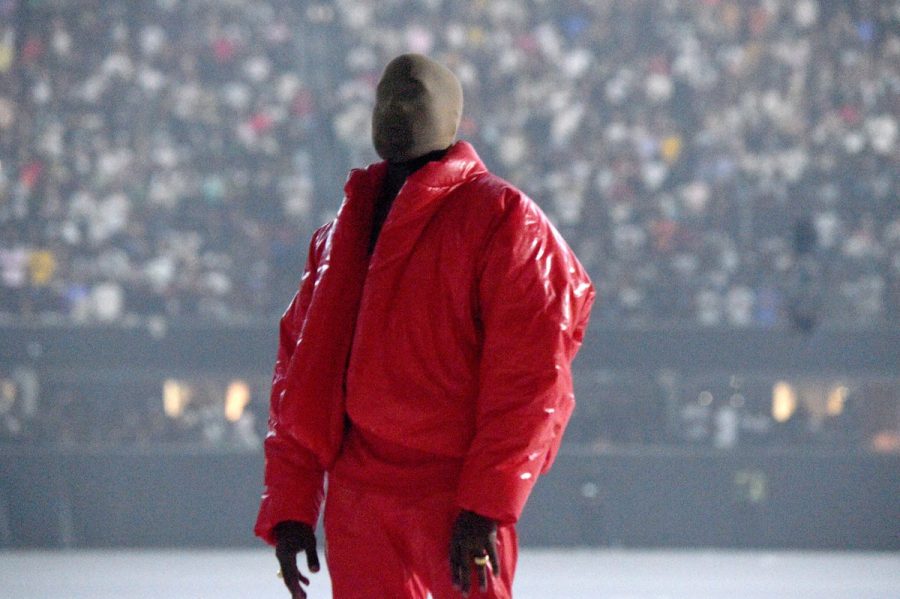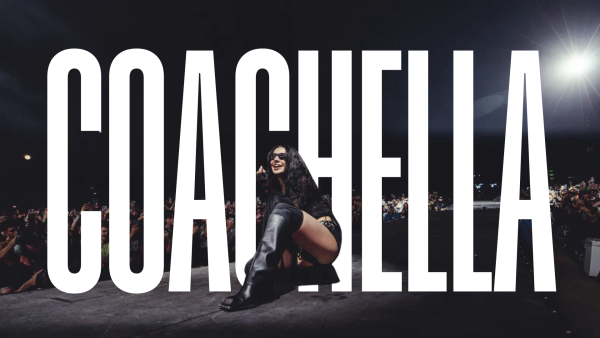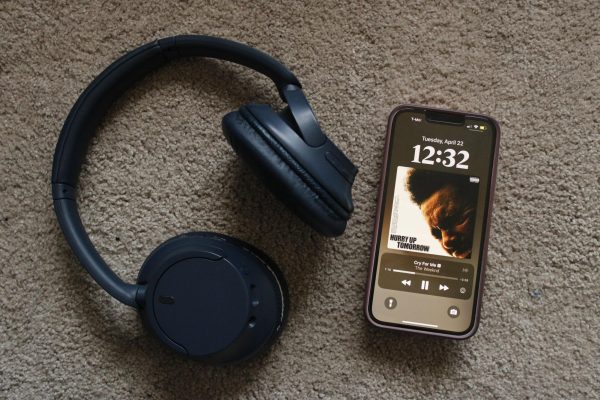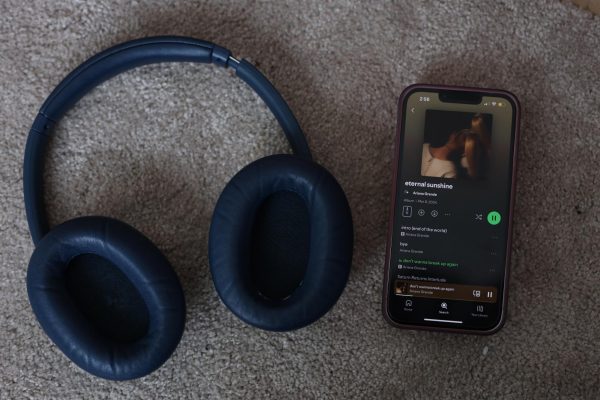Kanye West’s “Donda” is a Chaotic Masterpiece
West previews an unfinished “Donda” at his first listening event in Mercedes-Benz stadium. (courtesy of Twitter)
Nearly two decades ago, the landscape of the rap game was changed forever when Kanye West released his debut album, “The College Dropout.” Since then, West has reinvented himself into a larger-than-life pop culture phenomenon, pushing creative boundaries and never failing to be a beacon of controversy.
This August, West released “Donda,” his 10th studio album. The 108-minute long project is a chaotic tribute to his late mother, featuring a haphazard collection of guest appearances, new sources of controversy and flashes of West’s mad genius. In short, “Donda” is everything a Kanye West album should be.
It would be impossible to analyze this album without discussing the unorthodox way it was presented to the public. West unveiled “Donda” through three listening events: two in his birthplace of Atlanta and the final in his hometown of Chicago. The events allowed listeners a glimpse into the artist’s creative process, as each performance featured a slightly more finished version of the album, with songs and verses being added, removed and rearranged.
The final listening event was a masterclass in performance art. The audience saw West rebuild his childhood home in the middle of Soldier Field, light himself on fire and then publicly affirm his wedding vows with Kim Kardashian, who filed for divorce from West earlier this year. The listening events helped turn “Donda” into a truly immersive experience and will hopefully pave the way for more artists to experiment with theatrical album rollouts.
Just like everything else West touches, the listening events were not without controversy. During the final event, West stood on the porch of his replicated childhood home alongside DaBaby, who recently came under fire for homophobic remarks, and Marilyn Manson who is currently facing allegations of abuse from multiple women. Some fans speculated that the inclusion of the two was a metaphor meant to represent the two sinners crucified alongside Jesus, while others simply chalked it up as a ploy to create headlines and gain attention. Either way, it marks another entry in West’s long history of ignorant and tasteless moves.
Pulling away the shroud of controversy that surrounds “Donda” reveals a truly magnificent offering of experimental hip-hop. The album opens with “Donda Chant,” a song that is simply his mother’s name repeated 60 times, and is reportedly set to the rhythm of her last heartbeats. This unsettling intro is immediately followed by the anthemic guitars of “Jail,” a soaring track in which Kanye uses imprisonment as a way to address his own shortcomings and express faith in his religion.
“Jail” immediately cements itself as a standout, yet as the album continues, Kanye continues to present tracks that outdo one another. “God Breathed” is reminiscent of the aggressive and industrial sounds of his 2010 album “Yeezus,” while “Off the Grid” is a Brooklyn-drill-inspired banger. Songs like “Hurricane,” “Jonah” and “Moon” are atmospheric slow-burners that draw listeners into West’s twisted spirituality. “Heaven and Hell,” “New Again” and “Pure Souls” all feel like crazed expressions of West’s intense personal emotions.
The crown jewel of the album is the track “Come to Life,” which features some of the most powerful and touching production of West’s career and lyrically sees him grapple with his mental health and relationship problems.
The production on this record certainly continues the gospel themes from his last project, “Jesus is King.” However, instead of a Sunday morning church trip, “Donda” feels more like an otherworldly experience, and is much more captivating than his previous religious project.
The album is not without its weak points, one of which is “Tell the Vision,” a track that feels thrown together and consists of a poorly mixed beat under a posthumous Pop Smoke appearance. The three bonus tracks at the end of the album, which are just alternate versions of earlier songs, feel unnecessary and take away from the cohesiveness of the project.
Perhaps the most distinct part of “Donda” is the volume of features West chose to include. The album features appearances from Jay-Z, The Weeknd, Travis Scott and Lil Baby. What is amazing, however, is the fact that almost every guest performance adds to the overall experience and feels essential to the album as a whole.
Jay-Z, who hasn’t collaborated with West in over a decade, starts the features off with a powerful verse on “Jail,” in which he addresses Kanye’s mother directly, and confronts West over his involvement with Donald Trump.
The standout feature of the album surprisingly comes from the New York drill rapper Fivio Foreign on “Off The Grid.” Nestled between verses from Playboi Carti and West himself, Fivio Foreign taps into a previously unseen well of rap mastery and delivers perhaps the best performance of his career.
Vory, an up and coming singer from Texas, appears multiple times across the album, most notably on “Jonah” in which he provides a beautiful vocal hook for the track. He’s far from the only vocalist to deliver an outstanding performance, as both The Weeknd and Don Toliver show off their angelic voices.
Lil Baby and Lil Durk, two rappers typically known for their street-rap styles, also shine as Lil Baby floats effortlessly over the “Hurricane” beat and Lil Durk delivers an emotional verse on “Jonah.”
The diversity of the content on “Donda” undoubtedly makes for a chaotic listen, as West restlessly oscillates between genres and themes. At first listen, it is hard to grasp how this bloated, messy project represents anything about West’s grief for his mother. However, a deeper experience with the album reveals that “Donda” is exactly what it should be.
Dr. Donda West was an integral part of her son’s life. She raised him as a single mother, supported him when he dropped out of school, and even moved across the country with him to help him pursue his dream. She passed away in 2007 after complications with plastic surgery. West blamed himself for her passing, and told Q magazine “If I had never moved to L.A. she’d be alive.” From an outside perspective, it seems that West’s never-ending spiral into controversy, mental health struggles and public outbursts started with the death of his mother.
Listening to “Donda” feels like listening to the desperate attempt of a troubled man trying to find some sense of stability in his chaotic life. His attempts to connect with his religion and fix his personal relationships feel intense and genuine and, at the same time, misguided and lost. “Donda” is an amazing piece of art because it offers an unapologetic and comprehensive view into West’s tumultuous mind.
West could have released a more subtle and focused project to deal with the death of his mother, like his 2017 album “Ye,” that dealt with his bi-polar disorder. Instead, he assembled a sprawling supporting cast of musicians, sold out three stadiums and created an immersive album experience. “Donda” might not be the perfect rap album, but it might just be the perfect Kanye West album.











































































































































































































